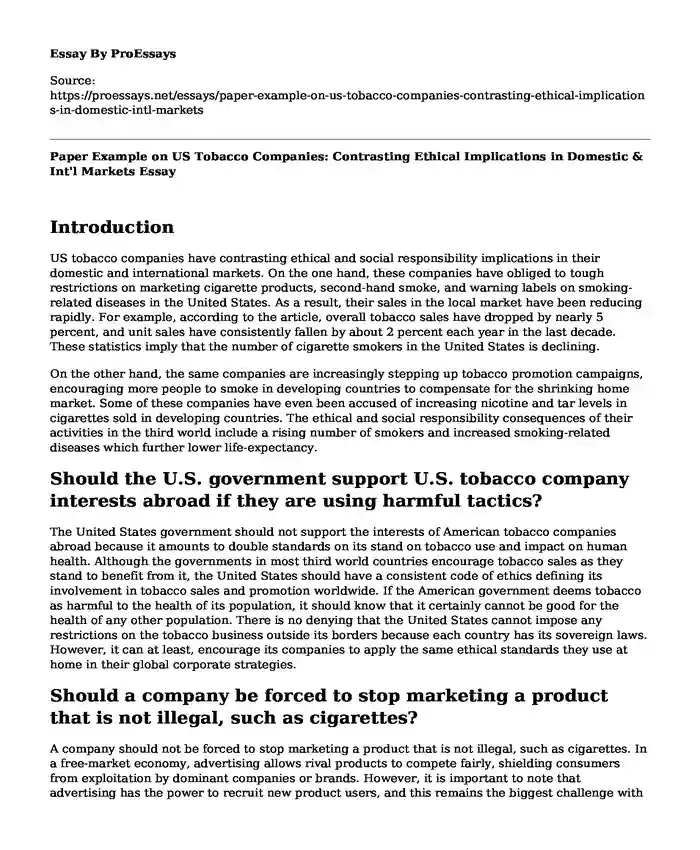Introduction
US tobacco companies have contrasting ethical and social responsibility implications in their domestic and international markets. On the one hand, these companies have obliged to tough restrictions on marketing cigarette products, second-hand smoke, and warning labels on smoking-related diseases in the United States. As a result, their sales in the local market have been reducing rapidly. For example, according to the article, overall tobacco sales have dropped by nearly 5 percent, and unit sales have consistently fallen by about 2 percent each year in the last decade. These statistics imply that the number of cigarette smokers in the United States is declining.
On the other hand, the same companies are increasingly stepping up tobacco promotion campaigns, encouraging more people to smoke in developing countries to compensate for the shrinking home market. Some of these companies have even been accused of increasing nicotine and tar levels in cigarettes sold in developing countries. The ethical and social responsibility consequences of their activities in the third world include a rising number of smokers and increased smoking-related diseases which further lower life-expectancy.
Should the U.S. government support U.S. tobacco company interests abroad if they are using harmful tactics?
The United States government should not support the interests of American tobacco companies abroad because it amounts to double standards on its stand on tobacco use and impact on human health. Although the governments in most third world countries encourage tobacco sales as they stand to benefit from it, the United States should have a consistent code of ethics defining its involvement in tobacco sales and promotion worldwide. If the American government deems tobacco as harmful to the health of its population, it should know that it certainly cannot be good for the health of any other population. There is no denying that the United States cannot impose any restrictions on the tobacco business outside its borders because each country has its sovereign laws. However, it can at least, encourage its companies to apply the same ethical standards they use at home in their global corporate strategies.
Should a company be forced to stop marketing a product that is not illegal, such as cigarettes?
A company should not be forced to stop marketing a product that is not illegal, such as cigarettes. In a free-market economy, advertising allows rival products to compete fairly, shielding consumers from exploitation by dominant companies or brands. However, it is important to note that advertising has the power to recruit new product users, and this remains the biggest challenge with the marketing of authorized harmful products like cigarettes. Thus, it is the marketing messages of tobacco companies that should be restricted to ensure they only appeal to adult smokers to switch to their brands without trying to persuade non-smokers (mostly teenagers) to use their products.
Read the article below and summarize the marketing approach that Juul has taken to promote itself as a health-conscious company, even as it develops potentially more addictive vaping products
According to the article, Juul has taken a confusing marketing approach to promoting its brand as a health-conscious company. Under the pretense of providing a convenient alternative that helps with smoking cessation, it came up with vaping products that are as harmful as the Big Tobacco but enjoy a more positive public image. Vaping products are easier to market as many people are ignorant of their ethical conflicts. Although their advertisements are cleverly designed to appear like anti-smoke awareness campaigns targeting older adults struggling with smoke cessation, their fancy packaging is meant to precisely appeal to the youth. The products seem healthier than cigarettes because they come in sleek electronic packages with fruity and minty flavors, are smoke-free, and leave no lingering foul smell in the air. However, they are far more addictive than cigarettes as they contain a higher concentration of nicotine, which is the reason why people easily switch from big tobacco. As such it does not end nicotine addiction.
Cite this page
Paper Example on US Tobacco Companies: Contrasting Ethical Implications in Domestic & Int'l Markets. (2023, Sep 26). Retrieved from https://proessays.net/essays/paper-example-on-us-tobacco-companies-contrasting-ethical-implications-in-domestic-intl-markets
If you are the original author of this essay and no longer wish to have it published on the ProEssays website, please click below to request its removal:
- Politics of China, Political Economy of EA: Teaching Methodology
- Bariatric Surgery Manual Paper Example
- Research Paper on Women's Health: Cervical Cancer Screening Guidelines for Ages 20-29
- Fate in The Iliad: Women & War Prizes - Essay Sample
- Cross-Cultural Perceptions of Body Image: A Review of Obesity Etiology - Essay Sample
- Essay Example on Understanding Demand in Business: Impact of Price and Quantity Demanded
- Essay Example on A House in the Bamboo: Wang Wei's Chinese Tang Poem







